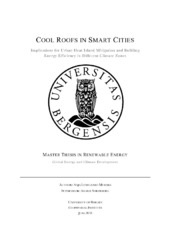Cool Roofs in Smart Cities: Implications for Urban Heat Island Mitigation and Building Energy Efficiency in Different Climate Zones
Master thesis
Permanent lenke
https://hdl.handle.net/1956/18619Utgivelsesdato
2018-10-05Metadata
Vis full innførselSamlinger
- Geophysical Institute [1195]
Sammendrag
As climate change contributes to elevate urban temperatures, undesirable consequences like increased energy consumption, reduced air and water quality and elevated levels of thermal stress for the population continue to threaten the urban environment. It is paramount to address issues related to urban sustainability, environmental performance and energy demand as climate change intensifies and the urban population rapidly continues to grow. Smart city strategies to promote urban sustainability and efficiency are emerging, and mitigation of the urban heat island (UHI) effect through implementation of cool roofs can contribute to reduce these adverse effects by lowering urban temperatures and reducing the cooling loads of buildings and the associated GHG emissions. Through the use of a 1-D bulk urban canopy model combined with an atmospheric layer model, this thesis aims to build a framework for assessing the cool roof mitigation potential on the UHI effect and the associated response in cooling energy demand for the cities of Cairo, Chicago, Delhi, Rome and Singapore. The resulting change in cooling energy demand for space cooling were calculated using degree-days. The results displayed a general reduction in temperature after cool roofs were implemented for all cities, indicating a significant UHI mitigation potential. The magnitude of the UHI effect was reduced by 23-31% after the large-scale introduction of cool roofs, while the temperature-dependent energy demand during the summer period was also reduced, ranging from 10-33% between the different cities.
Utgiver
The University of BergenOpphavsrett
Copyright the Author. All rights reservedBeslektede innførsler
Viser innførsler beslektet ved tittel, forfatter og emneord.
-
Where are urban energy transitions governed? Conceptualizing the complex governance arrangements for low-carbon mobility in Europe
Haarstad, Håvard (Peer reviewed; Journal article, 2016-05)This article addresses the question of where urban low-carbon energy transitions are governed. A challenge is that urban governance is not simply urban, but a complex assemblage of institutions, networks and socio-technical ... -
Are smart city projects catalyzing urban energy sustainability?
Haarstad, Håvard; Wathne, Marikken Wullf (Peer reviewed; Journal article, 2019)The purpose of this paper is to investigate the links between smart cities and urban energy sustainability. Because achieving a “smart city” is a wide agenda rather than a specific set of interventions, smartness itself ... -
Double energy vulnerability in the Norwegian low-carbon urban transport transition
Sareen, Siddharth; Waage, Markus; Smirnova, Polina; Boakye Botah, Jeffery; Loe, Morten Ryen (Journal article, 2022)Household energy poverty and transport energy poverty are increasingly recognised as entangled in energy social science. The intersection of these related phenomena is growing due to twin transitions of decarbonisation and ...
